选用助动词avoir和être的要点
- 格式:doc
- 大小:37.00 KB
- 文档页数:4
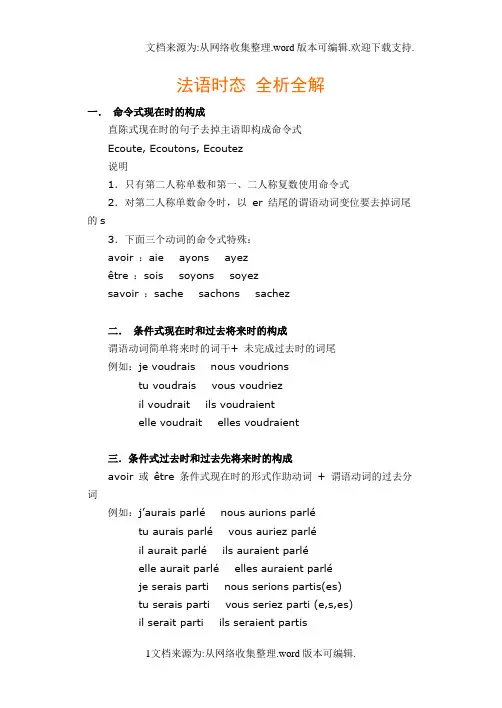
法语时态全析全解一.命令式现在时的构成直陈式现在时的句子去掉主语即构成命令式Ecoute, Ecoutons, Ecoutez说明1.只有第二人称单数和第一、二人称复数使用命令式2.对第二人称单数命令时,以er 结尾的谓语动词变位要去掉词尾的s3.下面三个动词的命令式特殊:avoir :aie ayons ayezêtre :sois soyons soyezsavoir :sache sachons sachez二.条件式现在时和过去将来时的构成谓语动词简单将来时的词干+ 未完成过去时的词尾例如:je voudrais nous voudrionstu voudrais vous voudriezil voudrait ils voudraientelle voudrait elles voudraient三.条件式过去时和过去先将来时的构成avoir 或être 条件式现在时的形式作助动词+ 谓语动词的过去分词例如:j’aurais parlé nous aurions parlétu aurais parlévous auriez parléil aurait parléils auraient parléelle aurait parléelles auraient parléje serais parti nous serions partis(es)tu serais parti vous seriez parti (e,s,es)il serait parti ils seraient partiselle serait partie elles seraient parties四.虚拟式现在时的构成先把谓语动词变成直陈式第三人称复数形式,去掉词尾ent,加:e ionses ieze ent例如:que je parle que nous parlionsque tu parles que vous parliezqu’il parle qu’ils parlentqu’elle parle qu’elles parlent注:少部分第三组不规则动词的变位特殊(常用的动词约二十个)五.虚拟式过去时的构成avoir 或être 虚拟式现在时的形式作助动词+ 谓语动词的过去分词例如:que j’aie parlé que nous ayons parléque tu aies parléque vous ayez parléqu’il ait parlé qu’ils aient parléqu’elle ait parlé que’elles aient parléque je sois parti que nous soyons partis(es)que tu sois parti que vous soyez parti (e,s,es)qu’il soit parti qu’ils soient partisqu’elle soit partie qu’elles soient parties纵观上述各时态的构成,我们可以将它们分为简单形式的时态和复合形式的时态两种,通过分析复合形式的各种时态,我们会发现:只要我们掌握了助动词avoir 和être的动词各简单形式的时态变位和动词的过去分词,各时态的构成问题则迎刃而解;而简单形式的各种时态中,最复杂的变位当数直陈式现在时和简单过去时,虚拟式现在时次之,简单将来时、过去将来时和未完成过去时更次之。
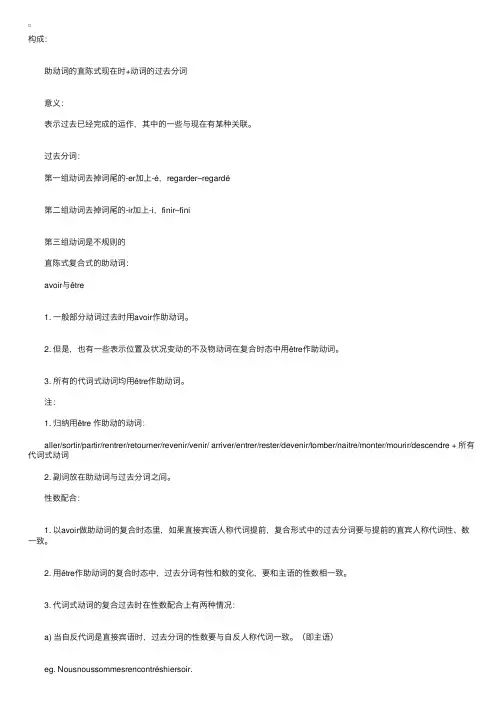
构成: 助动词的直陈式现在时+动词的过去分词 意义: 表⽰过去已经完成的运作,其中的⼀些与现在有某种关联。
过去分词: 第⼀组动词去掉词尾的-er加上-é,regarder–regardé 第⼆组动词去掉词尾的-ir加上-i,finir–fini 第三组动词是不规则的 直陈式复合式的助动词: avoir与être 1. ⼀般部分动词过去时⽤avoir作助动词。
2. 但是,也有⼀些表⽰位置及状况变动的不及物动词在复合时态中⽤être作助动词。
3. 所有的代词式动词均⽤être作助动词。
注: 1. 归纳⽤être 作助动的动词: aller/sortir/partir/rentrer/retourner/revenir/venir/ arriver/entrer/rester/devenir/tomber/naitre/monter/mourir/descendre + 所有代词式动词 2. 副词放在助动词与过去分词之间。
性数配合: 1. 以avoir做助动词的复合时态⾥,如果直接宾语⼈称代词提前,复合形式中的过去分词要与提前的直宾⼈称代词性、数⼀致。
2. ⽤être作助动词的复合时态中,过去分词有性和数的变化,要和主语的性数相⼀致。
3. 代词式动词的复合过去时在性数配合上有两种情况: a) 当⾃反代词是直接宾语时,过去分词的性数要与⾃反⼈称代词⼀致。
(即主语) eg. Nousnoussommesrencontréshiersoir. b) 当⾃反代词是间接宾语时,过去分词不变。
eg. Ellessesontlavélesmains. 4. 当泛指代词tout作直接宾语时,它位于助动词与过去分词之间。
eg. Ilatoutvu.。
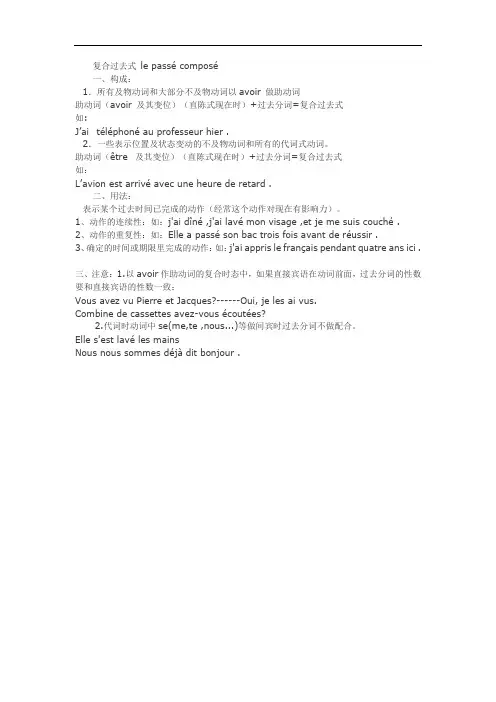
复合过去式le passé composé一、构成:1.所有及物动词和大部分不及物动词以avoir 做助动词助动词(avoir 及其变位)(直陈式现在时)+过去分词=复合过去式如:J’ai téléphoné au professeur hier .2.一些表示位置及状态变动的不及物动词和所有的代词式动词。
助动词(être 及其变位)(直陈式现在时)+过去分词=复合过去式如:L’avion est arrivé avec une heure de retard .二、用法:表示某个过去时间已完成的动作(经常这个动作对现在有影响力)。
1、动作的连续性:如:j'ai dîné ,j'ai lavé mon visage ,et je me suis couché .2、动作的重复性:如:Elle a passé son bac trois fois avant de réussir .3、确定的时间或期限里完成的动作:如:j'ai appris le français pendant quatre ans ici .三、注意:1.以avoir作助动词的复合时态中,如果直接宾语在动词前面,过去分词的性数要和直接宾语的性数一致:Vous avez vu Pierre et Jacques?------Oui, je les ai vus.Combine de cassettes avez-vous écoutées?2.代词时动词中se(me,te ,nous...)等做间宾时过去分词不做配合。
Elle s'est lavé les mainsNous nous sommes déjà dit bonjour .。
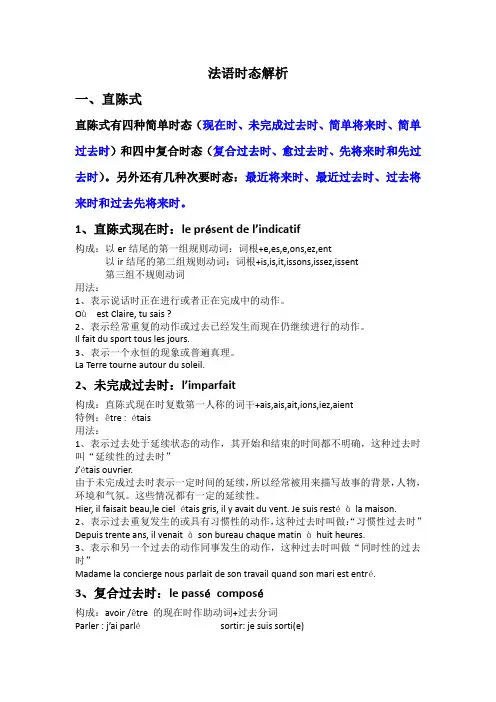
法语时态解析一、直陈式直陈式有四种简单时态(现在时、未完成过去时、简单将来时、简单过去时)和四中复合时态(复合过去时、愈过去时、先将来时和先过去时)。
另外还有几种次要时态:最近将来时、最近过去时、过去将来时和过去先将来时。
1、直陈式现在时:le présent de l’indicatif构成:以er结尾的第一组规则动词:词根+e,es,e,ons,ez,ent以ir结尾的第二组规则动词:词根+is,is,it,issons,issez,issent第三组不规则动词用法:1、表示说话时正在进行或者正在完成中的动作。
Oùest Claire, tu sais ?2、表示经常重复的动作或过去已经发生而现在仍继续进行的动作。
Il fait du sport tous les jours.3、表示一个永恒的现象或普遍真理。
La Terre tourne autour du soleil.2、未完成过去时:l’imparfait构成:直陈式现在时复数第一人称的词干+ais,ais,ait,ions,iez,aient特例:être : étais用法:1、表示过去处于延续状态的动作,其开始和结束的时间都不明确,这种过去时叫“延续性的过去时”J’étais ouvrier.由于未完成过去时表示一定时间的延续,所以经常被用来描写故事的背景,人物,环境和气氛。
这些情况都有一定的延续性。
Hier, il faisait beau,le ciel étais gris, il y avait du vent. Je suis restéàla maison.2、表示过去重复发生的或具有习惯性的动作,这种过去时叫做:“习惯性过去时”Depuis trente ans, il venait àson bureau chaque matin àhuit heures.3、表示和另一个过去的动作同事发生的动作,这种过去时叫做“同时性的过去时”Madame la concierge nous parlait de son travail quand son mari est entré.3、复合过去时:le passécomposé构成:avoir /être 的现在时作助动词+过去分词Parler : j’ai parlésortir: je suis sorti(e)Se lever : je me suis levé(e)用法:1、表示和现在有联系的一般尚未完全过去的时间内完成的动作Il a bcp plu cet hiver.2、表示在过去不确定的时刻完成的动作J’ai achetéune voiture.3、表示一个延续到现在时刻的动作之前已经完成的另一个动作4、Quand on a perdu sa carte bancaire, il faut tout de suite le signaler àla banque.4、简单过去时:le passésimple构成:第一组动词词干+ai, as ,a,âmes,âtes,èrent第二组动词词干+is,is,it,îmes,îtes,irent第三组动词词干+is,is,it,îmes,îtes,irent(partir,voir )+us,us.ut,ûmes,ûtes,urent( vouloir ,courir)Venir : vins,vins,vint,vînmes,vîntes,vinrentTenir : tins,tins,tint,tînmes,tîntes,tinrent用法:1、表示在过去某一确定的时间内已完成的动作,该动作没有延续性,和现在没有什么联系Il mourut dans les premiers jours de janvier .他死于一月初2、用来叙述一连串的动作,这些动作是一个接一个发生的3、有的作家在描写一种延续性的重复性的动作时,突出动作的完成。
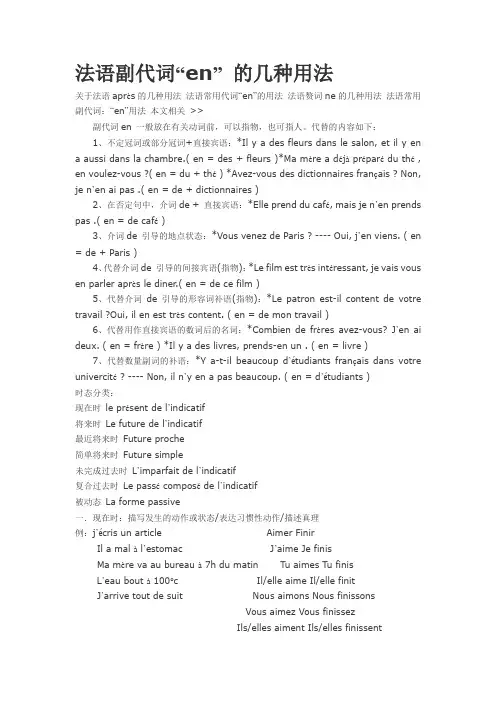
法语副代词“en”的几种用法关于法语après的几种用法法语常用代词“en”的用法法语赘词ne的几种用法法语常用副代词:“en”用法本文相关>>副代词en 一般放在有关动词前,可以指物,也可指人。
代替的内容如下:1、不定冠词或部分冠词+直接宾语:*Il y a des fleurs dans le salon, et il y ena aussi dans la chambre.( en = des + fleurs )*Ma mère a déjà préparé du thé , en voulez-vous ?( en = du + thé ) *Avez-vous des dictionnaires français ? Non, je n’en ai pas .( en = de + dictionnaires )2、在否定句中,介词de + 直接宾语:*Elle prend du café, mais je n’en prends pas .( en = de café )3、介词de 引导的地点状态:*Vous venez de Paris ? ---- Oui, j’en viens. ( en = de + Paris )4、代替介词de 引导的间接宾语(指物):*Le film est très intéressant, je vais vous en parler après le diner.( en = de ce film )5、代替介词de 引导的形容词补语(指物):*Le patron est-il content de votre travail ?Oui, il en est très content. ( en = de mon travail )6、代替用作直接宾语的数词后的名词:*Combien de frères avez-vous? J’en ai deux. ( en = frère ) *Il y a des livres, prends-en un . ( en = livre )7、代替数量副词的补语:*Y a-t-il beaucoup d’étudiants français dans votre univercité ? ---- Non, il n’y en a pas beaucoup. ( en = d’étudiants )时态分类:现在时le présent de l’indicatif将来时Le future de l’indicatif最近将来时Future proche简单将来时Future simple未完成过去时L’imparfait de l’indicatif复合过去时Le passé composé de l’indicatif被动态La forme passive一.现在时:描写发生的动作或状态/表达习惯性动作/描述真理例:j’écris un article Aimer FinirIl a mal à l’estomac J’aime Je finisMa mère va au bureau à 7h du matin Tu aimes Tu finisL’eau bout à 100°c Il/elle aime Il/elle finitJ’arrive tout de suit Nous aimons Nous finissonsVous aimez Vous finissezIls/elles aiment Ils/elles finissent动词分组:第一组(-er) 第二组(-ir) 第三组(-re)二.简单将来时动词变化:以-rai -ras -ra -ra -rons -rez -ront -ront 结尾Etre AvoirJe serai J’auraiTu seras Tu aurasIl/elle sera Il/elle auraNous serons Nous auronsVous serez Vous aurezIls/elles seront Ils/elles auront例:Demain j’irai au cinéma.Elle sera ici demail.三.最近过去时:表达刚刚结束的动作Venir de +动词原形Je viens de partir.我刚刚走四.最近将来时:表示马上就要进行的动作Aller+动词原形Je vais aller au cinéma.我将要去电影院五.未完成过去时:表达过去描写的背景/ 环境/人物动词变化:以-ais -ais -ait -ait –ions- iez –aient –aient结尾未完成过去时主要表达/描写/叙述/事情,表达过去发生的习惯性动作Hier martin ,il faisait mauvais, le ciel était nuageux.昨天早上天气很坏,乌云密布Quand j’étais à Paris ,je me promenais tous les jours le long de la Seine.当我在巴黎时,每天我都去河边散步六.复合过去时:表示已经结束的动作动词变化être(avoir)+过去分词Il est sorti 他出去了Elle a démenagé他已经搬家了*Etre做助动词用于venir partir entrer montre desendre reste tombre sortir等注以se 形式的自反动词也用être做助动词剩下用avoir做助动词第一组动词将词尾-er换成-é parler parlé第二组动词将词尾-ir换成-i finir fini第三组动词有四种词尾:-i -u -s -t sortirrépondremettredire sortirépondumisdit 有些第三组动词过去分词:avoir eu être été faire fait lire lu attendre attendu entendre entendu connaître connu vouloir voulu pouvoir pu savoir su voir vu boire bu falloir fallu pleuvoir plu prendre pris comprendre compris écrire écrit*Bien, déjà, beaucoup, encore等副词放在助动词与过去分词之间。
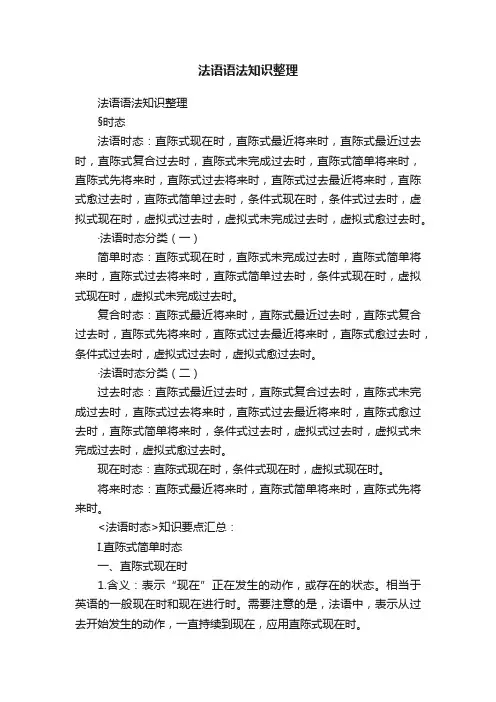
法语语法知识整理法语语法知识整理§时态法语时态:直陈式现在时,直陈式最近将来时,直陈式最近过去时,直陈式复合过去时,直陈式未完成过去时,直陈式简单将来时,直陈式先将来时,直陈式过去将来时,直陈式过去最近将来时,直陈式愈过去时,直陈式简单过去时,条件式现在时,条件式过去时,虚拟式现在时,虚拟式过去时,虚拟式未完成过去时,虚拟式愈过去时。
·法语时态分类(一)简单时态:直陈式现在时,直陈式未完成过去时,直陈式简单将来时,直陈式过去将来时,直陈式简单过去时,条件式现在时,虚拟式现在时,虚拟式未完成过去时。
复合时态:直陈式最近将来时,直陈式最近过去时,直陈式复合过去时,直陈式先将来时,直陈式过去最近将来时,直陈式愈过去时,条件式过去时,虚拟式过去时,虚拟式愈过去时。
·法语时态分类(二)过去时态:直陈式最近过去时,直陈式复合过去时,直陈式未完成过去时,直陈式过去将来时,直陈式过去最近将来时,直陈式愈过去时,直陈式简单将来时,条件式过去时,虚拟式过去时,虚拟式未完成过去时,虚拟式愈过去时。
现在时态:直陈式现在时,条件式现在时,虚拟式现在时。
将来时态:直陈式最近将来时,直陈式简单将来时,直陈式先将来时。
<法语时态>知识要点汇总:I.直陈式简单时态一、直陈式现在时1.含义:表示“现在”正在发生的动作,或存在的状态。
相当于英语的一般现在时和现在进行时。
需要注意的是,法语中,表示从过去开始发生的动作,一直持续到现在,应用直陈式现在时。
2.用法:①表示现在存在的状态,经常发生的动作。
②表示一个人的性格、特征。
③表示客观事实或普遍真理。
需要注意的是,当直接引语变间接引语时,如果引语部分是客观事实或普遍真理,从句的时态用直陈式现在时,不与主句的时态做配合。
④表示说话时正在发生的事情。
二、直陈式未完成过去时1.表示过去当时正在发生的事情,相当于过去进行时,表示这件事的发生的起止时间是不明确的,在所谈到的时间段内一直延续进行。
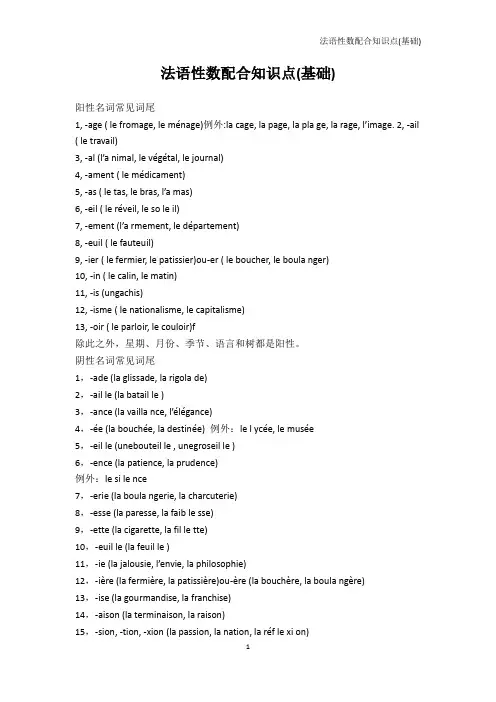
法语性数配合知识点(基础)阳性名词常见词尾1, -age ( le fromage, le ménage)例外:la cage, la page, la pla ge, la rage, l’image. 2, -ail ( le travail)3, -al (l’a nimal, le végétal, le journal)4, -ament ( le médicament)5, -as ( le tas, le bras, l’a mas)6, -eil ( le réveil, le so le il)7, -ement (l’a rmement, le département)8, -euil ( le fauteuil)9, -ier ( le fermier, le patissier)ou-er ( le boucher, le boula nger)10, -in ( le calin, le matin)11, -is (ungachis)12, -isme ( le nationalisme, le capitalisme)13, -oir ( le parloir, le couloir)f除此之外,星期、月份、季节、语言和树都是阳性。
阴性名词常见词尾1,-ade (la glissade, la rigola de)2,-ail le (la batail le )3,-ance (la vailla nce, l’élégance)4,-ée (la bouchée, la destinée) 例外:le l ycée, le musée5,-eil le (unebouteil le , unegroseil le )6,-ence (la patience, la prudence)例外:le si le nce7,-erie (la boula ngerie, la charcuterie)8,-esse (la paresse, la faib le sse)9,-ette (la cigarette, la fil le tte)10,-euil le (la feuil le )11,-ie (la jalousie, l’envie, la philosophie)12,-ière (la fermière, la patissière)ou-ère (la bouchère, la boula ngère)13,-ise (la gourmandise, la franchise)14,-aison (la terminaison, la raison)15,-sion, -tion, -xion (la passion, la nation, la réf le xi on)16,-té (抽象词:la beauté, la bonté, la charité)17,-ude (la solitude, l’habitude)18,-ure (la le cture, l’écriture)此外以eur结尾的单词大部分是阴性,例如:la douceur, la cha le ur, la rougeur, 但是(没有但是就不是法语了),也有不少例外,如:le bonheur, le malheur, l’ingénieur... 19,-eau (la chapeau la manteau)20 -窗户fenetre -课程lecon职业名词变化规律e结尾的不用变(用冠词体现)一般规则加e(e结尾的不变)-er 结尾的改为-ère-eur结尾的改为-euse/-esse/-ice(个别有例外prieur,e)-f/-p结尾的,词尾变为-ve以-x结尾的,词尾变为se以-c结尾的,词尾变为-que或/cque以an,en,on结尾的改为anne,enne,onne复合过去式过去分词性数配合e结尾阴性不变,阴性加e,复数加s,阴性复数es指示形容词ce,cet,cette,ces用来确指人和物。
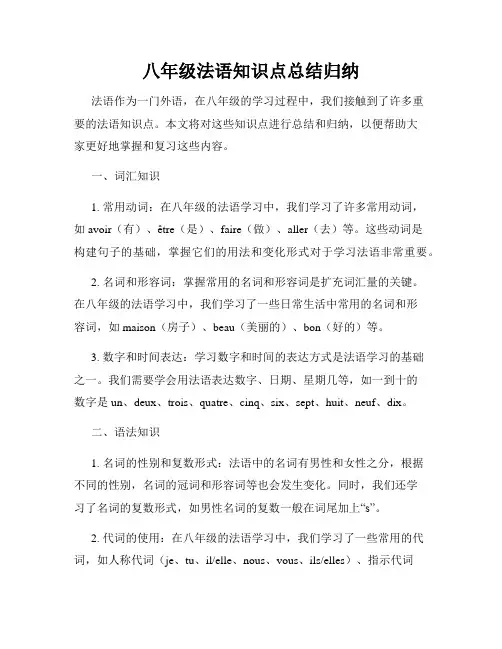
八年级法语知识点总结归纳法语作为一门外语,在八年级的学习过程中,我们接触到了许多重要的法语知识点。
本文将对这些知识点进行总结和归纳,以便帮助大家更好地掌握和复习这些内容。
一、词汇知识1. 常用动词:在八年级的法语学习中,我们学习了许多常用动词,如avoir(有)、être(是)、faire(做)、aller(去)等。
这些动词是构建句子的基础,掌握它们的用法和变化形式对于学习法语非常重要。
2. 名词和形容词:掌握常用的名词和形容词是扩充词汇量的关键。
在八年级的法语学习中,我们学习了一些日常生活中常用的名词和形容词,如maison(房子)、beau(美丽的)、bon(好的)等。
3. 数字和时间表达:学习数字和时间的表达方式是法语学习的基础之一。
我们需要学会用法语表达数字、日期、星期几等,如一到十的数字是un、deux、trois、quatre、cinq、six、sept、huit、neuf、dix。
二、语法知识1. 名词的性别和复数形式:法语中的名词有男性和女性之分,根据不同的性别,名词的冠词和形容词等也会发生变化。
同时,我们还学习了名词的复数形式,如男性名词的复数一般在词尾加上“s”。
2. 代词的使用:在八年级的法语学习中,我们学习了一些常用的代词,如人称代词(je、tu、il/elle、nous、vous、ils/elles)、指示代词(ce/cet/cette/ces)等。
掌握这些代词的用法和变化形式可以帮助我们更好地表达自己的意思。
3. 动词的时态和语态:八年级的法语学习中,我们学习了一些基本的动词时态和语态,如现在时(présent)、过去时(passé composé)等。
掌握这些时态和语态的用法和构成规则是进行准确交流的关键。
三、句型结构1. 简单句:在八年级的法语学习中,我们学会了构建简单句的基本方法,即主语+动词+宾语的结构。
同时,我们还学习了一些常见的句型,如询问句(Est-ce que...?)、否定句(ne pas...)等。
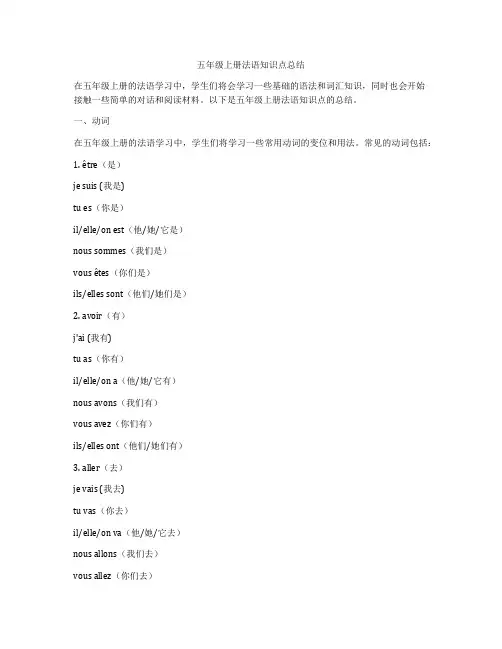
五年级上册法语知识点总结在五年级上册的法语学习中,学生们将会学习一些基础的语法和词汇知识,同时也会开始接触一些简单的对话和阅读材料。
以下是五年级上册法语知识点的总结。
一、动词在五年级上册的法语学习中,学生们将学习一些常用动词的变位和用法。
常见的动词包括:1. être(是)je suis (我是)tu es(你是)il/elle/on est(他/她/它是)nous sommes(我们是)vous êtes(你们是)ils/elles sont(他们/她们是)2. avoir(有)j'ai (我有)tu as(你有)il/elle/on a(他/她/它有)nous avons(我们有)vous avez(你们有)ils/elles ont(他们/她们有)3. aller(去)je vais (我去)tu vas(你去)il/elle/on va(他/她/它去)nous allons(我们去)vous allez(你们去)ils/elles vont(他们/她们去)4. faire(做)je fais (我做)tu fais(你做)il/elle/on fait(他/她/它做)nous faisons(我们做)vous faites(你们做)ils/elles font(他们/她们做)5. venir(来)je viens (我来)tu viens(你来)il/elle/on vient(他/她/它来)nous venons(我们来)vous venez(你们来)ils/elles viennent(他们/她们来)以上是一些常用的动词,学生们在学习中要注意它们的变位和用法。
二、名词在五年级上册的法语学习中,学生们将学习一些常见的名词,以及它们的单复数形式和性别。
常见的名词包括:1. un garçon(男孩)2. une fille(女孩)3. un chat(猫)4. une maison(房子)5. une école(学校)6. un livre(书)7. une table(桌子)8. un stylo(钢笔)9. une feuille(纸)学生们需要记住这些名词的单复数形式以及其所属的性别。
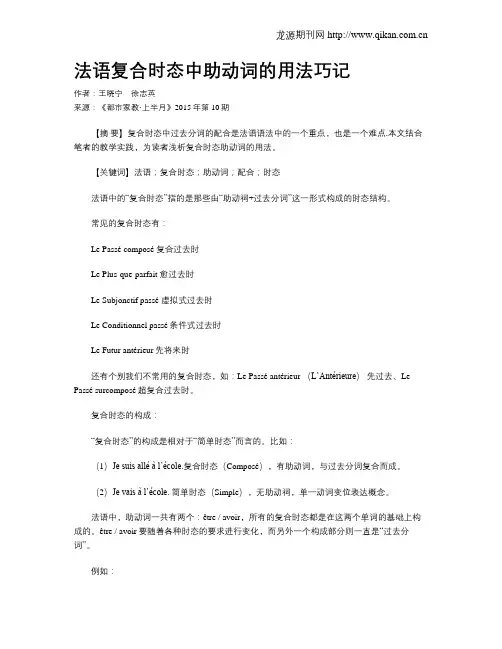
法语复合时态中助动词的用法巧记作者:王晓宁徐志英来源:《都市家教·上半月》2015年第10期【摘要】复合时态中过去分词的配合是法语语法中的一个重点,也是一个难点.本文结合笔者的教学实践,为读者浅析复合时态助动词的用法。
【关键词】法语;复合时态;助动词;配合;时态法语中的“复合时态”指的是那些由“助动祠+过去分词”这一形式构成的时态结构。
常见的复合时态有:Le Passé composé复合过去时Le Plus-que-parfait 愈过去时Le Subjonctif passé虚拟式过去时Le Conditionnel passé条件式过去时Le Futur antérieur先将来时还有个别我们不常用的复合时态,如:Le Passé antérieur (L’Antérieure)先过去、Le Passé surcomposé超复合过去时。
复合时态的构成:“复合时态”的构成是相对于“简单时态”而言的。
比如:(1)Je suis allé à l’école.复合时态(Composé),有助动词,与过去分词复合而成。
(2)Je vais à l’école. 简单时态(Simple),无助动祠,单一动词变位表达概念。
法语中,助动词一共有两个:être / avoir,所有的复合时态都是在这两个单词的基础上构成的。
être / avoir要随着各种时态的要求进行变化,而另外一个构成部分则一直是“过去分词”。
例如:(1)Je suis restée à la maison toute la soirée. 复合过去时:être / avoir的直陈式现在时+过去分词。
(2)Je ne crois pas qu’il soit parti. 虚拟式过去时:être / avoir的虚拟式现在时+过去分词。
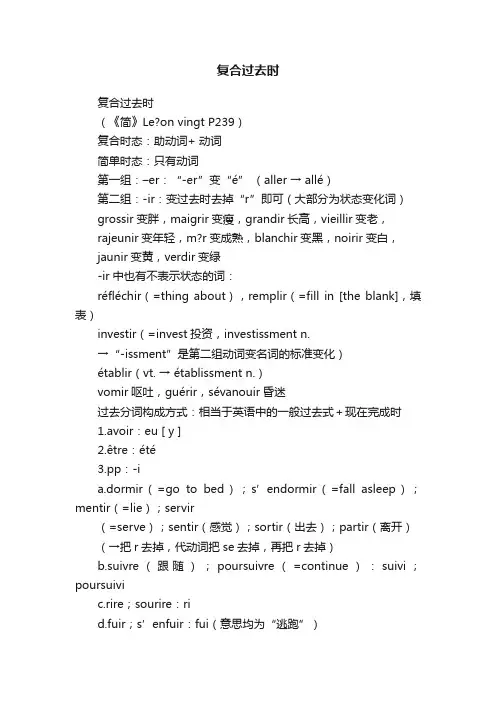
复合过去时复合过去时(《简》Le?on vingt P239)复合时态:助动词+ 动词简单时态:只有动词第一组:–er:“-er”变“é” (aller → allé)第二组:-ir:变过去时去掉“r”即可(大部分为状态变化词)grossir变胖,maigrir变瘦,grandir长高,vieillir变老,rajeunir变年轻,m?r变成熟,blanchir变黑,noirir变白,jaunir变黄,verdir变绿-ir中也有不表示状态的词:réfléchir(=thing about),remplir(=fill in [the blank],填表)investir(=invest投资,investissment n.→“-issment”是第二组动词变名词的标准变化)établir(vt. → établissment n.)vomir呕吐,guérir,sévanouir昏迷过去分词构成方式:相当于英语中的一般过去式+现在完成时1.avoir:eu [ y ]2.être:été3.pp:-ia.dormir(=go to bed);s’endormir(=fall asleep);mentir(=lie);servir(=serve);sentir(感觉);sortir(出去);partir(离开)(→把r去掉,代动词把se去掉,再把r去掉)b.suivre(跟随);poursuivre(=continue):suivi;poursuivic.rire;sourire:rid.fuir;s’enfuir:fui(意思均为“逃跑”)4.pp:-ua.tenir(=hold),retenir(=recite),venir,revenir,devenir,prévenir(通知;~qch. de qn.),obtenir(获得),se souvinir(记得;~+ de qch. / qn.):tenub.courir(跑步;购物),parcourir(流经,浏览):couruc.=receive),décevoir(使…失望),s’apercevoir(注意,觉察到):d.voir,prévoi r(预见到),revoir:vue.savoir(知道):suf.pouvoir:pug.devoir:d?(加长音符为了区分du缩合冠词)h.pleuvoir(下雨):plui.plaire(使…高兴):pluj.falloir:fallu(=must,用于无人称句:Il faut ...)k.vouloir:voulul.rendre(归还),vendre(售卖),attendre(等待),entendre(听见),perdre(丢失),mordre(咬),répondre (回答),descendre(下降),dépendre (=depend,~de qn.):rendum.conna?tre(认识),reconna?tre(承认),appara?tre(出现),dispara?tre (消失),méconna?tre(错误了解),compara?tre(出庭),para?tre(出现):connun.battre(=beat),combattre(战斗):battuo.croire(高兴):crup.boire(喝):buq.conclure(=conclude),inclure,exclure:conclur.résoudre(resolve):résolus.lire(读,看):lut.vivre(生活):vécu5.pp:-sa.s’asseoir(坐下):assisb.prendre,apprendre,comprendre,surprendre:apprisc.mettre(放置),permettre(允许),promettre(承认),transmettre(传递),remettre(推迟):mis6.pp:-ta.mourir(死亡):mortb.ouvrir(打开),couvrir(=cover),découvrir (=discover),recouvrir(=recover),offrir(=offer),souffrir(=suffer):ouvertc.peindre(=plaint),joindre(=join),craindre(=be afraid of),se plaindre(抱怨= complaint,plaindre:同情):peintd.faire:faite.dire:ditf.écrir:écr itg.conduire(开车),construire(=construct),produire,détruire(=destroy),traduire(=translate),cuire(=cool),séduire (=seduce),nuire(=do harm to;~à qn.),réduire,introduire(引进,导入;présenter介绍):conduit7.其他a.na?tre(诞生,出生):né以avoir为助词的复合过去时(《简》P240)avoir + vt. / 大部分的vi.(相当于英语中的have done sth.)如:Ne vous a-t-il pas parlé de ?a ?他没有给你们说这事么?注意介词位置,或者用:Il ne vous a pas parlé de ?a ?★否定句中名词作主语,禁止S+V倒装;应该在动词谓语后,加出与谓语同性数的主格人称代词。
avoir和sentir搭配感受 L'emploi de l'auxiliaire « avoir » ou « être » avec le verbe « convenir » change son sens. 动词convenir分别与助动词avoir和être搭配时,含义不一样。 Avoir convenu = signifie « plaire », « être approprié », « être convenable » « correspondre aux besoins aux aptitudes ». avoir convenu表示“使中意”、“合适”、“适合”、“能力满足要求”。 Exemples : 例子: Ce rôle m’a convenu jusqu’ici. 直到现在我还喜欢那个角色。 Le marteau que tu lui as donné lui a très bien convenu. 你给他的锤子他使起来非常趁手。 L’appartement que nous avons visité nous a parfaitement convenu. 我们很满意刚刚看过的公寓。 On délibérera sur ce qu’il aurait convenu de faire. 他们将商议该做什么好。 Être convenu = signifie décider d’un commun accord, « être d’accord », « faire avec quelqu’un un accord » ou « reconnaître la vérité ». être convenu表示意见达成一致,“同意”、“赞同某人观点”或者“承认事实”。 Exemples : 例子: Les ambassadeurs sont convenus d’arrêter les négociations. 大使们一致同意停止商谈。 Nous étions convenus de la date de mardi comme date butoir. 我们同意将周二作为最后期限。 Êtes-vous convenus de vous revoir après ce premier rendez-vous ? 第一次约会后你们还愿意再见面吗? L’emploi exclusif de l’auxiliaire « avoir » dans tous les sens se généralise toutefois. L’Académie considère cet emploi comme fautif. Au XIXe siècle, Littré le condamnait déjà en citant Rousseau : 助动词avoir的各种例外用法非常常见。法兰西学院认为与convenir有关的这种用法是错误的。19世纪时,《法语词典》就通过引用卢梭的话,指出了这个错误。 J. J. Rousseau a conjugué convenir, dans le sens de reconnaître la vérité, avec avoir : Ne reparlons plus de cela, je vous prie ; j’ai convenu de mon tort de trop bonne grâce, pour que vous deviez vous en souvenir, [Rousseau, Lett. à Duchesne, 21 nov. 1771] 卢梭在用convenir表示“承认事实”时,使用的助动词是avoir:求求您,别说了;为了您能记得我,我自愿承认我的错误。(卢梭,《写给迪歇纳的信》,1771年11月21日) Cela n'est pas correct. 这是不正确的。 Cependant, le Girodet et le Grevisse remarquent, sans la condamner, que cette confusion l’emporte aujourd’hui dans l’usage, même à l’écrit. 然而,Girodet和Grevisse(法语语言学家)并无责怪地指出,直到今天,这种混淆仍会出现在书写中。 Exemples de grands écrivains qui emploient « avoir » au lieu de « être » cités par le Grevisse : 以下是Grevisse列出的作家们选择与convenir配合的助动词时,错用avoir替代être的例子: Nous avons convenu que je ne t’écrirai qu’au bout d’un certain temps. 我们一致同意,我过一段时间再给你写信。 Stendhal, Correspondance 司汤达,《通信集》 Ils avaient convenu de se retrouver à Rome 他们决定在罗马再见。 Rolland, Jean-Christophe 罗兰,《约翰·克里斯朵夫》 J’avais convenu avec Albertine […] qu’elle viendrait me voir un peu avant minuit. 我同意贝蒂的意见她午夜前会来看看我。 Proust, À la recherche du temps perdu 普鲁斯特,《追忆似水年华》 Il ne pouvait se défendre d’une tristesse dont il n’avait jamais convenu 他不由自主地悲伤,尽管他从不承认。 Mauriac, Thérèse Desqueyroux 莫里亚克,《寂寞的心灵》 La forme impersonnelle « il convient de » signifie « il est souhaitable de ». 无人称词组il convient de表示“是合适的”。
过去时最近过去时:用以表达一个刚刚完成的动作venire de faire复合过去时:表达过去已经完成的动作;表达过去一段时间内完成的动作;描写一连串过去发生的完成的动作。
avoir 或être 的直陈式现在时形式作助动词+谓语的过去分词(一般表示去向的动词用être 作助动词,大概20 个)ai, as, a, avons, avez, ont;suis, es, est, sommes, êtes, sont.(部分不及物动词(表去向)和代动词用être,用être 时过去分词有性数变化,代动词的性数变化需注意:如果自反是直接宾语,即自反或是相互意义,过去分词必须和自反代词的性数相配合;如果自反代词是间接宾语,过去分词没有性数变化。
)未完成过去时:描写过去的背景,人物,环境,气氛;表示过去的习惯性动作;表达过去起止时间不明确的动作;表示动作发生的同时性(一个动作发生时,另一个动作正在延续;两个动作都在延续);在Si 引导的从句中,与条件时配合,表达实现可能性不大。
动词的直陈式第一人称复数形式去掉词尾ons,加:ais, ais, ait, ions, iez, aient.(étais, étais, était, étions, étiez, étaient)Commercer-commençais, commencionsManger-mangeais, mangionsétudier-étudiais, étudiionsvoir-voyais, voyions愈过去时:表达在过去某一动作之前就完成的动作,一般和复合过去时,未完成过去时或简单过去时配合使用;在si引导的条件句中,与条件式过去时配合,表示与事实完全相反的假设avoir 或être 的直陈式未完成过去时形式作助动词+ 谓语的过去分词avais,avais,avait,avions,aviez,avaientétais,étais,était,étions,étiez,étaient简单过去时:表示过去某一确定时间内已经完成的某一行为或一系列动作;与未完成过去时配合,描写新出现的情况.动词过去分词以é结尾的,去掉é加词尾:ai,as,a,âmes,âtes,èrent其谓语动词的过去分词以i 结尾的,去掉i 加词尾:is,is,it,îmes, îtes,irent其谓语动词的过去分词以u 结尾的,去掉u 加词尾:us,us,ut, ûmes,ûtes,urent特殊:être il fut ils furentavoir il eut[ily] ils eurent[lizy :r]venir il vint ils vinrent注:简单过去时不再用于口语,仅限于小说、传记和历史记载,其动词变位往往也仅限于第三人称单复数,因此对初学者来说,达到能够识别就可以了。
avoir做助动词复合时态的过去分词配合(转)在以avoir作助动词的复合时态中,过去分词通常要和提前的直接宾语的性数相配合。
但在这个⼀般原则之外,还存在着⼀些特殊的情况需要注意:1. 在现代法语中,直接宾语是代词en时,过去分词不配合:J’ai cueilli des prunes et j’en ai mangé.(我摘了好多李⼦,⼜吃了些。
)Des promesses,j’en ai beaucoup fait.(诺⾔,我许了很多。
)2. 直接宾语是中性代词le时,过去分词不配合 :Cette équipe s’est adjugé facilement la victoire,comme je l’avais pressenti.(这个队轻松地获得胜利,正如我之前预料的⼀样。
)[le为中⼼代词] Cette victoire,je l’ai pressentie.(这次胜利是我预料之中的。
)[la为直宾代词]3. 感官动词如voir, entendre, sentir, écouter, regarder, apercevoir等可以直接接动词不定式,如果提前了的直接宾语是动词不定式的主语,感官动词的过去分词就要和直接宾语的性数相配合;如果提前了的直接宾语是动词不定式的直接宾语,感官动词的过去分词不配合:la pianiste que j’ai entendue jouer(我听过其演奏的那个钢琴家) ;la sonate que j’ai entendujouer(我听过有⼈演奏的那⾸奏鸣曲)。
4. Laisser,faire这两个动词可以接不定式,表⽰让某⼈做某事。
其提前的直接宾语是动词不定式的宾语时,laissé和fait都不配合:cette maison que j’ai fait construire(我让⼈建的这座房⼦);ces arbres que j’ai laissé abattre(我让⼈砍掉的这些树)。
1. avoir confiance en qqn(代词为重读人称代词)相信、信任某人;对某人有信心dans qqch 相信某事,对某事有信心faire confiance à qqn/qqch 相信某人或某事,对某人或某事抱有信心➢J’ai maintenant plus de confiance en lui que lui-même. 现在我对他的信任胜过他的自信。
➢Il a confiance dans l’avenir.他对未来充满信心。
2. à l’avance提前,预先en avance 提早,预先↔ en retard 指动作在预定的时间之前发生,即提前。
➢Dites-moi à l’avance quand vous revenez. (=avant le moment fixé)➢Il est arrivé en avance et j’ai dû attendre un quart d’heure. (= à l’heure prévue) (↔en retard) 3. faire qqchsur le conseil de qqn根据某人的建议做某事,注意动词surfaire qqch sur les ordres de qqn 奉……之命,奉……的命令être sous lesordres de qqn在某人的指挥下做某事4. 命令式同虚拟式相同或基本相同的动词savoir : sache sachons sachezavoir :aie ayons ayezêtre : soit soyons soyez➢Aie de la patience !➢Sois patient !5.être issu,e de ......出身于...来自...à l’issue de ..... 在……结束后....➢Il est issu d’une famille pauvre.➢Il y aura une conférence de presse à l’issu de la cérémonie.6.en cas de+ n. (sans article) 在... 情况下en cas de besoin 在需要的情况下➢En cas de difficulté, vous pouvez me téléphoner.7.sauf si 除非+ind.➢Je viendrai à l’heure,sauf si je ne suis pas invité.8.s’excuser de 请求原谅……,为……而道歉➢Il s’excuse de ne pas l’avoir prévenue de son absence.9.pour peu que + subj.只要稍微➢Pour peu qu’on réfléchisse, on comprendra pourquoi la critiqu e est dure pour son œuvre.只要稍微思考一下,就会明白为什么对他作品的评论会如此尖锐了。
法语语法时态Le présent de l’indicadif表示现在正在进行的事情、过去的历史性描写、在口语里表示即将发生的事情Danser garder penser tenter sonner-e -ons-es -ez-e -entFinir remplir choisir unir réussir-is -issons-is -issez-it -issentAvoir être aller venir faire vouloir devoir recevoir acheter écrire vendre appeleracquérir (acquis) s’asseoir vaincre (vaincu) battre (battu) craindre (craint) rire (ri) conclure (conclu) dire (dit) lire (lu) vivre (vécu) résoudre (résolu) cueillir (cueilli)Passé composé1. -er -é2.-ir -i3.p.114être avoir faire aller venir partir sortir sentirétéeu fait allévenu parti sorti senticonduire traduire construire vouloir devoir boire lire voir dire pleuvoir conduit traduit construit voulu dûbu lu vu dit plu表示过去已经完成的动作,用于口语。
J’ ai lu ce roman.Il est arrivé.Il a plu hier.Tu as dîné?Il est devenu pilote.être 做助动词,过去分词跟主语配合。
Révisions(unité 6 – unité 11)I.Les actes de paroleII.Le vocabulaireIII.Les points de grammaireIV.L‟interculturelI.Les actes de paroleManger au resto ou à la maisonLa vie à l‟universitéUn voyage / les vacancesFaire des achats au marché ou au supermarchéVoir un médecinParler du travail ou de la professionII. Le vocabulaireLes nationalités + les languesLes objetsLes adjecitfs de couleursLes endroits publics dans une villeLe logement / la maisonLes professionsLes activités quotidiennesLes alimentsLes transportsLes voyages / les vacancesL‟école / l‟enseignement: les cours; les élèves; les professeurs Faire des achatsSe situer dans le temps : prépositions et locution de préposition La santé et le corpsIII. Les points de grammaireLes pronoms:-pronoms personnels sujets;-pronoms personnels toniques;-pronoms personnels réfléchis;-pronoms personnels COD;-pronoms personnels COI;-pronoms adverbiaux « y » « en »;-pronom neutre « le »;-pronom relatif « qui »;-pronoms indéfinis « on » « tout, tous, toutes »Les points de grammaire (suite)Les verbes transitifs et les verbes intransitifsLes verbes pronominauxLe passé composé de l‟indicatif:-les deux auxiliaires: “avoir”; “être”-le participe passéLe futur immédiat / le passé immédiatL‟impératifL a mise en relief: “c‟est…que” / “c‟est …qui”La négation et “de” dans la négationLes phrases complexes et les phrases simplesLes adjectifs qualificatifs: le nombre, le genre et la placeLes noms des Etats et les prépositionsI Mettez les verbes entre parenthèses au passécomposéet traduisez les phrases en chinois (将括号内的动词变成复合过去时,并将句子翻译成汉语):1 Est-ce que tu (voir) as vu le directeur avant de partir ?2 V ous (oublier) avez oublié de nous attendre.3 Elle (mettre) a mis des couteaux et des fourchettes sur la table.4 Il (pleuvoir) a plu cette nuit.5 Ils (avoir) ont eu une réunion hier soir.6 Nous (être) avons été à la campagne l’été dernier.7 Elles (faire) ont fait la sieste après le déjeuner.8 (pouvoir) J’ai pu finir ce travail grâce à vous.9 Il (prendre) a pris le train de 8 heures.10 Elle (ne pas vouloir) n’a pas voulu voir ce genre de films.11 (ouvrir) J’ai ouvert les fenêtres avant de me coucher.12 V ous (ne pas écrire) n’avez pas écrit à votre frère.13 (avoir) J’ai une grippe.14 L’infirmière (demander) m’a demandé de lui expliquer ce dialogue.15 La malade (avoir) a eu une forte fièvre.16 Leur père (attraper) a attrapé une grippe.17 L’infirmière (faire) a fait une piqûre à ce malade.18 (Passer) Avez-vous passé une soirée agréable ?19 (Prendre) As-tu pris les médicaments ?20 Cette pièce (ennuyer) a beaucoup ennuyé les spectateurs.21 Ils (interrompre) ont interrompu leur réunion pour vous parler.22 (attendre) J’ai attendu longtemps mes amis.23 Est-ce que nous (déranger) avons dérangé ces camarades ?24 Tu (voir) as vu quelque chose ?25 Est-ce que Susanne (apprendre) a appris le chinois en France ?26 Ils (boire) ont bu du thé à midi ?27 Tu (oublier) n’as rien oublié ?28 Est-ce que le professeur (expliquer) a bien expliqué cette leçon ?29 V ous (comprendre) avez compris sa question ?30 V ous (revendre) n’avez pas revendu votre billet ?31 Comment (jouer) a joué cet acteur ?32 Est-ce que tous les spectateurs (applaudir) ont applaudi ?33 Qu’est-ce que vous (dire) avez dit à vos amis ?34 Qu’est-ce que la jeune fille (offre) a offert à son père ?35 Cette veste (coûter) m’a coûté très cher.36 (vouloir) J’ai voulu attendre encore un peu.37 On (pouvoir) n’a pas pu trouver de poisson.38 La cliente (payer) a-t-elle payé à la caisse ?39 Nous (remplir) avons rempli tous les imprimés.40 (téléphoner) J’ai téléphoné de nouveau à mon ami.41 L’employé (vérifier) a vérifié le paquet, mais il (peser) ne l’a pas encore pesé.42 Pourquoi (garder) a-t-il gardé ce roman trois mois ?43 (choisir) J’ai choisi une veste bleue.44 Elle (lire) a lu beaucoup de romans.45 Où (coller) as-tu collé le timbre ?46 Sa mère (être) a été vendeuse dans ce magasin.47 Lui (dire) avez-vous dit d’utiliser le dictionnaire ?48 Son cadeau (plaire) a plu à son ami.49 Sa fièvre (monter) est montée de nouveau.50 Tu (laver) n’a pas encore lavé les bols.51 Quand (prendre) avez-vous pris froid ?52 V os parents vous (permettre) ont permis de sortir ?II Mettez les phrases suivantes au passé composé :1 Le professeur Li enseigne la philosophie.Le professeur Li a enseigné la philosophie.2 Elle excuse son amie.Elle a excusé son amie.3 Il fait froid.Il a fait froid.4 Colette a un empêchement.Colette a eu un empêchement.5 Wang Fang montre quelque chose à Colette.Wang Fang a montré quelque chose à Colette.6 Wang Fang est heureuse de connaître Marianne.Wang Fang a été heureuse de connaître Marianne.7 Ils ne connaissent pas Jean.Ils n’ont pas connu Jean.8 Nous ne dînons pas à la cantine.Nous n’avons pas dîné à la ca ntine.9 Tu ne m’invites pas.Tu ne m’as pas invité.10 Je ne vois pas le menu.Je n’ai pas vu le menu.11 Nous ne prenons pas de pain à la vapeur.Nous n’avons pas pris de pain à la vapeur.12 Prends-tu ces romans modernes ?As-tu pris ces romans modernes ?13 Garde-t-elle ce dictionnaire ?A-t-elle gardé ce dictionnaire ?14 Lisez-vous des romans modernes ?Avez-vous lu des romans modernes ?15 Les spectateurs aiment-ils cet opéra ?Les spectateurs ont-ils aimé cet opéra ?16 La vendeuse vous rend-elle la monnaie ?La vendeuse vous a-t-elle rendu la monnaie ?17 Le père est-il content des progrès de sa fille ?Le père a-t-il été content des progrès de sa fille ?18 Ton ami te donne-t-il de bons conseils ?Ton ami t’a-t-il donné de bons conseils ?19 Ne les aides-tu pas à remplir les fiches ?Ne les as-tu pas aidés à remplir les fiches ?20 Ces fleurs ne font-elles pas plaisir à votre mère ?Ces fleurs n’ont-elles pas fait plaisir à votre mère ?法语中几种特殊的性数配合 |发布日期:2012-05-03 发布:初学法语者往往觉得法语很难学,尤其是那些第一外语是英语,第二外语是法语的学生更有此感。
选用助动词avoir和être的要点时态助动词avoir和être用于构成所有动词,包括它们本身的复合过去时和超复合过去时。
在构成复合时态时,使用助动词être和avoir要符合下列规则:◆主动态时,及物动词的复合时态必须要用avoir作为助动词:J'ai mangé. 我吃过了。
(复合过去时)J'avais acheté. 我以前买过。
(愈过去时)J'eus donné...我以前给过... (先过去时)◆代词式动词的复合时态必须要用助动词être:Je me suis blessée. 我受伤了。
Ils se seront battus. 他们将受到打击。
Nous nous étions regardés. 以前我们见过。
◆不及物动词的复合过去时有时用être作助动词,有时用avoir作助动词。
由être作助动词的不及物动词如下:accourir, advenir, aller, arriver, dédéder, demeurer, descendre, devenir, échoir, éclore, entrer, intervenir, monter, mourir, naître, partir, parvenir, rentrer, repartir, ressortir, rester, retomber, retourner, revenir, sortir, survenir, tomber, venir.其他所有的不及物动词的复合时态以及助动词être和avoir的复合时态要用avoir作为助动词:J'ai été ;j'ai eu.◆某些动词变位时可用avoir或être作助动词,取决于它们是及物(句例1)或不及物(例句2)的含义而定:J’ai descendu tous les paquets à la cave. (1) 我把所有的包放在地下室。
Je suis descendue par l’ascenseur. (2) 我乘电梯下楼。
◆助动词être也是被动态的助动词:Elle aime. → Elle est aimée.(被动态现在时)她喜欢。
→ 她受人喜欢。
Elle a aimé. → Elle a été aimée. (被动态复合过去时)她喜欢过。
→ 她曾被喜欢过。
法语介词“à”和“de”相互替代用法分析介词在法语中的应用极其广泛,其中它起着连接动词和不定式补语的作用。
法语初学者在理解这种连接关系而产生的语义变化时,存在着较大的困难。
因为,在法语中有相当一部分动词引出不定式补语时,需要由介词连接才能构成意义完整的句子。
不过,动词与介词的搭配一般受到动词的词义,语法结构,甚至于习惯等条件的约束。
虽然有时一个动词可以与多个介词搭配,但是仅从介词连接动词和不定式补语而言,介词“à”和“de”无疑是两个最常用,最具有代表性的介词。
这两个介词在纯语法关系方面所起的作用比任何其它介词所起的作用都更为突出。
随着时代的发展,这种连接关系也在不断演变。
因此,在介词“à”或“de”连接不定式补语时,我们经常发现介词“à”和“de”相互替代,有时干脆都省略的情况。
为此,笔者试就介词“à”和“de”在法语句子中这种互为变化,甚至有时相互替代的语法现象,从语法角度和语义学角度加以分析归纳,以便为法语初学者理解这一棘手的语法现象提供一些帮助。
I.介词à和de都可以引出不定式补语,两种结构在意义上基本相同。
不过,由介词de连接不定式补语;是常用结构。
由介词à连接不定式补语,是古体结构。
A. essayer de (à) +infin. 作“尽力做某事”解。
J’essaierai de vous satisfaire.我会尽力让你满意的。
(常用结构)Essayez sur ce point à le faire parler. (Corneille) 在这方面,你要尽量让别人说。
(高乃依)(书面语,古体结构)B.tâcher de (à) +infin. 作“努力,争取做某事”解。
Il tâche de ne pas voir les gens autour d’elle.(Aragon) 他力争不见那些围着她转的人。
(阿拉贡)(常用结构)Je vois qu’envers mon frère on tâche à me noircir. (Molière) 我发觉有人不顾我兄弟的反对想方设法诽谤我。
(莫里哀)(书面语,古体结构)II. 介词à和de都可以引出不定式补语,但与上述例1不同的是:由介词à连接不定式补语,是常用结构;由介词de连接不定式补语,是古体结构。
A. consentir à (de) +infin 作“同意做某事”解。
Il a consenti à nous recevoir. 他同意接待我们。
(常用结构)Pour que ces gens-là concentent d’aller en justice, il leur faut un juge bien huppé. (R.Benjamin) 他们需要一位赫赫有名的法官,以便使那些人同意诉诸于法院。
(R.邦雅曼)(古体结构)B. tarder à (de) +infin. 作“迟迟做某事”解。
Le couple ne tarde pas à être criblé de dettes. (Simenon) 一对夫妇很快就负债累累。
(西姆农)(常用结构)Je ne tarde pas d’aller mieux. (A.Gide) 我身体不久就会好的。
(A.纪德)(古体结构)III. 介词à或de连接不定式补语都是常用结构,并且意义相同。
不过介词de引出不定式时通常具有文学语言的特征, 并常用于复合形式或为避免元音重复。
A. commencer à (de) +infin. 作“开始做某事”解。
L’orchestre commence à jouer. 交响乐团开始演奏。
Une fois que l’on a commencé de s’occuper des affaires des autres, on doit aller jusqu’au bout. (Hébert) 一旦我们开始负责其它的事务,就应该负责到底。
(埃贝尔)B. continuer à (de) +infin. 作“继续做某事”解。
Si vous mourez, je vois mal comment je continuerai à vivre. (Adamo) 要是你死了,我难以想象我将如何生活下去。
(阿达莫)Patricia continua de sourire. (Kessel) 帕特茜雅继续微笑着。
(凯斯勒)IV. 由介词à或de分别连接不定式补语,在表达的含义上有所不同。
A. s’efforcer de + infin. 作“努力做某事”解。
s’efforcer à + infin. 作“勉强做某事”解。
Elle s’efforçait d’ouvrir l’étui du revoler. (Merle) (当时)她试图打开手枪套。
(梅尔)Il s’efforce à l’entraîner hors de la maison. (Didier) 他会尽力把他拉到屋外。
(迪迪埃)B. s’occuper de + infin.作“承担做某事;为…必须做…” 解。
s’occuper à + infin. 作“从事;忙于某事”解。
Je m’occuperai de vous procurer les pièces nécessaires.我会帮你搞到所有必要的证件。
Occupez-vous de trouver un bon hôtel. 请你负责找一个好旅馆。
Il s’occupe à jardinier e n jardinant. 他在园艺实践中从事园艺工作。
记住21个单词,搞定所有“-ir”结尾动词变位以-ir结尾的第二组规则变位动词有170个左右,记住“finir”的变位也就行了。
以-ir结尾的第三组不规则变位动词有20个左右的主体,把它们搞定了,以后就再也不用在 ir 变位是举棋不定了。
1)tenir retenir soutenir obtenir contenir maintenir entenir abstenir détenir appartenir 2) venir revenir devenir convenir contrevenir intervenirparvenir prévenir provenir se souvenir subvenir survenir3)ouvrir rouvrir recouvrir découvrir4)couvrir concouvrir encouvrir recouvrir secouvrirparcouvrir discouvrir5)guérir conguérir enguérir reguérir aguérir6)sentir ressentir consentir présentir7)servir: reservir deservir8)vêtir: revêtir dévêtir9)cueillir: recueillir décueillir10)partir11)sortir: resortir12)mentir: démentir13)dormir: endormir14)fuir: s’enfuir15)offrir16)souffrir17)mourir18)repentir19)bouillir20)assaillir tressaillir。